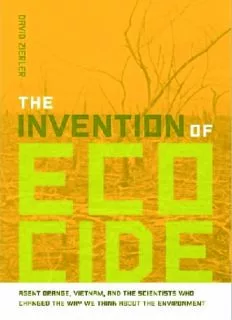
The Invention of Ecocide: Agent Orange, Vietnam, and the Scientists Who Changed the Way We Think About the Environment PDF
Preview The Invention of Ecocide: Agent Orange, Vietnam, and the Scientists Who Changed the Way We Think About the Environment
The InvenTIon of ecocIde DaviD Zierler AgenT orAnge, vIeTnAm, And The ScIenTISTS Who chAnged The WAy We ThInk AbouT The envIronmenT The UniversiTy of GeorGia Press • aThens and London the Friends Fund Publication of this work was made possible, in part, by a generous gift from the University of Georgia Press Friends Fund. Parts of chapter 8, “Against Protocol,” originally appeared in substantially different form as “Against Protocol: Ecocide, Détente, and the Question of Chemical Warfare in Vietnam, 1969–1975,” by David Zierler, in Environmental Histories of the Cold War, edited by J. R. McNeill and Corinna R. Unger, Copyright © 2010 the German Historical Institute. Reprinted with the permission of Cambridge University Press. The views, opinions, and interpretations expressed herein are those of the author alone and are not necessarily those of the U.S. Department of State or the U.S. Government. This book is based on fully declassified and open source material. © 2011 by the University of Georgia Press Athens, Georgia 30602 www.ugapress.org All rights reserved Designed by Walton Harris Set in 10.5/14 Minion Pro Printed digitally in the United States of America Library of Congress Cataloging-in-Publication Data Zierler, David, 1979– The invention of ecocide : agent orange, Vietnam, and the scientists who changed the way we think about the environment / David Zierler. p. cm. Includes bibliographical references. isbn-13: 978-0-8203-3826-2 (hardcover : alk. paper) isbn-10: 0-8203-3826-5 (hardcover : alk. paper) isbn-13: 978-0-8203-3827-9 (pbk. : alk. paper) isbn-10: 0-8203-3827-3 (pbk. : alk. paper) 1. Nature — Effect of human beings on. 2. Extinction (Biology) 3. Agent Orange — Health aspects. 4. Agent Orange — Toxicology. 5. Vietnam War, 1961–1975 — Chemical warfare. gf75.z54 2011 576.8'4 — dc22 2010044005 British Library Cataloging-in-Publication Data available To Sadie Vella Contents acknowledgments ix abbreviations xi one Introduction 1 two An Etymology of Ecocide 14 three Agent Orange before Vietnam 33 four Gadgets and Guerrillas 48 five Herbicidal Warfare 67 six Science, Ethics, and Dissent 89 seven Surveying a Catastrophe 112 eight Against Protocol 138 nine Conclusion: Ecocide and International Security 159 notes 169 bibliography 205 index 233 aCknowleDgments for the past several years I have been surrounded by a wonderful mix of family, friends, and colleagues whose advice and support helped me to create this book. Without them, I would not have been able to bridge my ideas with a topic that has proved sometimes unwieldy and always emotion- ally charged. All good things start at home. My family has lovingly sustained my schol- arly endeavors in too many ways to count. The storage space and home office have been a great help, but the intellectual vitality and good humor of my wife’s family and my own gave me the confidence and energy to see this project to its conclusion. To the Zierlers: Mom and Dad, Jeremy, Samantha, Jemma, Jonathan, and Zachary; and to the Akselrads: Mom and Dad, Rebecca, Benjamin, and Gila, and to my grandmothers, aunts, uncles, and cousins — thank you so much and I love you all. From dissertation proposal to book binding, The Invention of Ecocide took shape alongside my association with two of the great historical institutions in this country. The Department of History at Temple University provided a more fulfilling and exciting academic environment than any I could have dreamed up on my own. The Office of the Historian at the U.S. Department of State, in existence since 1861, is both an engine of annotation and declas- sification of the most important U.S. national security documents, and a center for policy-oriented historical analysis. I have relied heavily on the office’s output for my own work, and it is a great honor to be a part of it now. From 2004 to the present, one person has devoted superhuman levels of attention to my work. I came to Temple to study with Richard Immerman, that rare professor who is both a giant in his field and unbelievably attentive to his students. I would not be a historian without him. Richard is a gift to the historical profession, and it has been my good fortune to work with him at Temple and in his capacity as an advisor to the Office of the Historian. ix
Description: